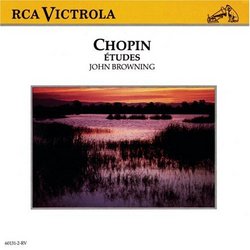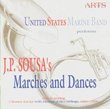| All Artists: Frederic Chopin, John Browning Title: Chopin: Etudes, Op.10/Op.25 Members Wishing: 1 Total Copies: 0 Label: RCA Release Date: 9/29/1989 Genre: Classical Styles: Forms & Genres, Etudes Number of Discs: 1 SwapaCD Credits: 1 UPC: 090266013128 |
Search - Frederic Chopin, John Browning :: Chopin: Etudes, Op.10/Op.25
 | Frederic Chopin, John Browning Chopin: Etudes, Op.10/Op.25 Genre: Classical
|
Larger Image |
CD DetailsSimilar CDs |
CD ReviewsBest Etudes recording I've heard 06/18/1999 (5 out of 5 stars) "Out of all the Etudes recordings (10+) I've heard, this one is by far the best; technically Browning is nearly perfect on this CD, but more importantly, he seems to understand how Chopin intended these pieces to sound, and never plays too fast or too slow, too loud or too soft; in Op.10 No.4, for example, his speed is astounding, but he still brings out perfectly the melodies and note combinations that others seem to miss. Op.10 No.12 is another example--often muddied due to overpedaling by others, but Browning's rendition is crystal-clear. He does the only worthwhile rendition of Op.25 No.10 I've heard--fast and furious in the beginning, slow and peaceful in the middle and even faster and more ominous in the end. In short, it's a must-have!" Tremendous Jeffrey Jones | Northern California, USA | 08/09/2005 (5 out of 5 stars) "John Browning died in 2003 at the age of 69; with his passing, we lost one of the true American greats. He belongs to the same generation as Gary Graffman, Leon Fleisher and Van Cliburn, but this CD in particular makes a compelling case for Browning as the finest of them all. His ability to play the seemingly millions of notes in the twenty-four Chopin Etudes is only the beginning of the story, although it is quite an accomplishment itself; this was by far the most difficult music in existence at the time it was written in the 1830s, and it remains a monumental challenge. But these Etudes are more than merely splashy virtuoso showpieces of the Prokofiev or Khachaturian variety. They take elegance, grace, and above all the operatic touch. A pianist who cannot also sing in a variety of ways will be lost, and this is where Browning shines. Listen to the "Revolutionary" Etude, Op. 10, No. 12; isn't the report of the right-hand chords interesting? It's crystal-clear, but the balance of the chords is shifted just a little bit so that it sounds slightly breathless, constrained, and desperate. It's a subtle touch that heightens the drama enormously, much in the way an actor will hone his delivery in subtle ways to express himself more poignantly. Or listen to the variety of touches and articulations in the F major etude, Op. 25, No. 3, which keep the repetitive rhythmical figure from getting stale. All of these are specifically requested by Chopin, by the way - most pianists make their own approaches based on feel, but Browning demonstrates that Chopin's directions, despite being rather dense and confusing at times, have their own logic. Each etude is treated with a similar kind of love and dedication; there is not a weak track on this disc. As such, it represents a tremendous value and a more than worthy purchase." Exellent technical display of cristal clear passages. Jeffrey Jones | 05/04/1999 (4 out of 5 stars) "It is in my opinion, that Browning is one of the greatest technician of the keyboard. Every note was clear, heard with carefull thought and passion. Many pianists have recorded the complete Chopin Etudes, but Brownings recording is far superior. -Matthew Weissman"
|

 Track Listings (24) - Disc #1
Track Listings (24) - Disc #1

